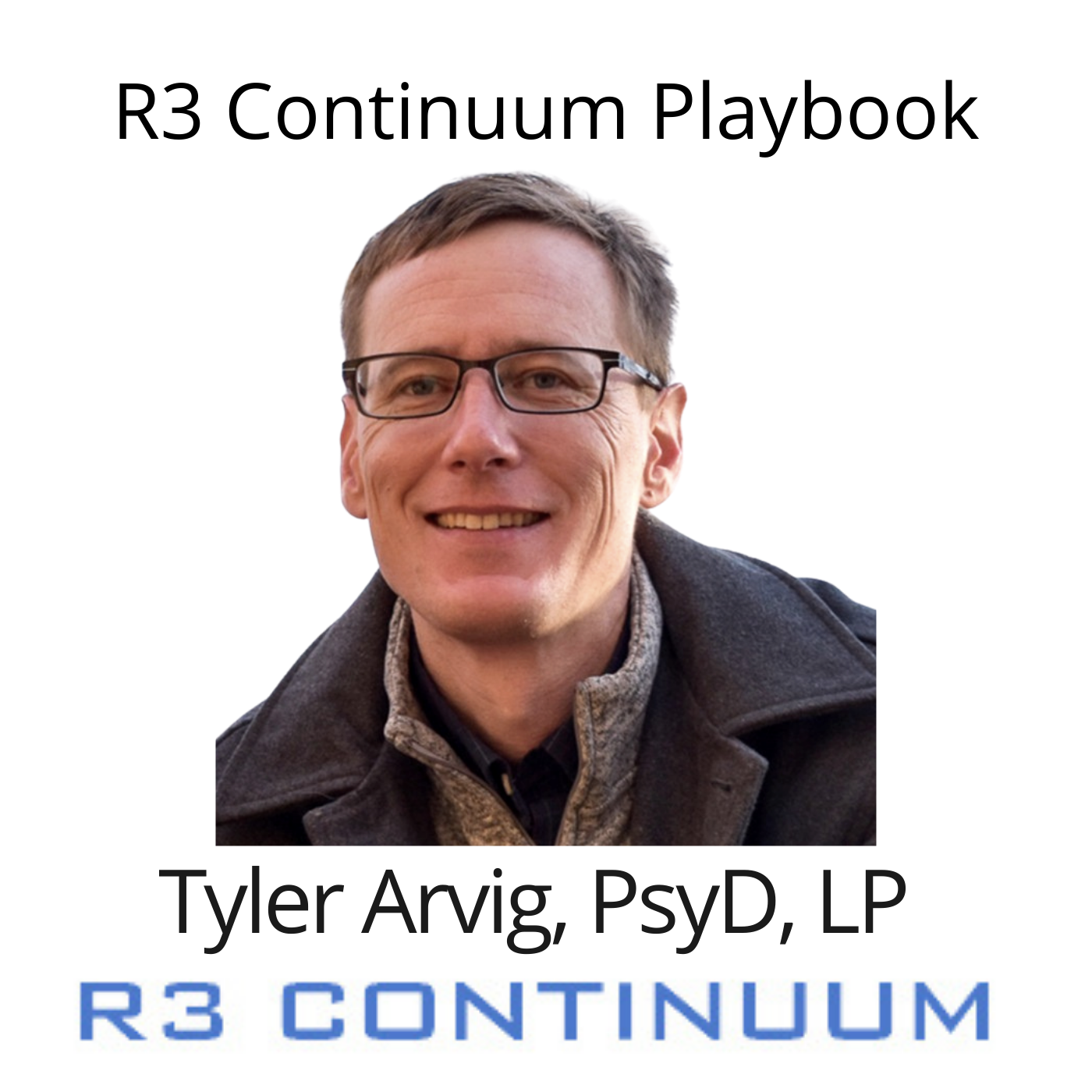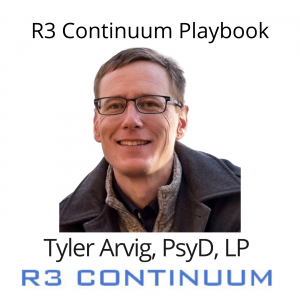
The R3 Continuum Playbook: Employee Burnout
Dr. Tyler Arvig reviewed conditions that create employee burnout and several tips for businesses to help curb burnout in their employees. The R3 Continuum Playbook is presented by R3 Continuum and is produced by the Minneapolis-St.Paul Studio of Business RadioX®. R3 Continuum is the underwriter of Workplace MVP, the show which celebrates heroes in the workplace.
TRANSCRIPT
Intro: [00:00:00] Broadcasting from the Business RadioX Studios, here is your R3 Continuum Playbook. Brought to you by Workplace MVP sponsor, R3 Continuum, a global leader in workplace behavioral health, crisis, and security solutions.
Tyler Arvig: [00:00:14] Hi. I’m Dr. Tyler Arvig, Associate Medical Director for R3 Continuum. And today, I want to talk about employee burnout. And, in particular, how to support your employees who might be struggling while managing life challenges and work demands.
Tyler Arvig: [00:00:32] Burnout has long been a topic of discussion in the workplace for obvious reasons. And although the term burnout isn’t my favorite, we all have a mental picture of what this might look like. Decreases in productivity and job satisfaction, lack of stamina, feeling as if you’re at a dead end. None of this is new. However, the current state of life poses new challenges and stressors that, for many, have increased the sense of feeling burned out.
Tyler Arvig: [00:01:02] Employees at every level are balancing work with more demands than ever before. There are increased family needs, social stressors, financial constraints, and lack of time to devote to recreational activities. This, combined with high levels of sustained anxiety, depression, and stress, can culminate in people reporting feeling burned out, having hit a wall, or just feeling stuck. With that, here are some helpful tips to keep in mind for your employees. This is not an exhaustive list, but we have seen these to be helpful in our extensive work around COVID-19 over the past year or so.
Tyler Arvig: [00:01:52] The first thing is to help others keep a sense of perspective. It’s easy to get drawn down into details or problems and to feel as if this represents someone’s life. The more we can do to keep perspective, including all of the things that are happening and how well we have done given the difficult situation that we’ve been in, the more likely we are to feel productive and satisfied in life. And the less likely we are to get that sense of feeling burned out.
Tyler Arvig: [00:02:25] The second thing is to learn to let things go. The old adage that you need to pick your battles certainly applies here. Being able to prioritize things that are truly important over things that are non-important will help us to make better decisions. Letting go of little things is one way to stave off a sense of burnout.
Tyler Arvig: [00:02:49] The third tip that I have is, first, to expect some hard days. This is not to say that we should assume every day is going to be hard. But it’s to say that some days are simply going to be a challenge. Yet every day is a new day. And just because today was hard doesn’t mean that tomorrow is going to follow suit.
Tyler Arvig: [00:03:12] The next tip is to keep a sense of humor. All too often as things get difficult, we forget to add levity in situations where it might be appropriate or helpful. Humor can help build relationships, relieve stress, and gain much needed perspective on a particular problem or situation. Appropriate humor can have an infectious positive effect on your work environment and can be a boon to productivity as well as employee satisfaction and devotion.
Tyler Arvig: [00:03:46] The next tip is for us to learn to accept good enough. Good enough will not suffice for every task that we do, but will suffice for most of the tasks that we do. Lowering the bar where it can be lowered into having the energy and drive to achieve the task that truly require the highest standard.
Tyler Arvig: [00:04:11] The next piece of advice would be, to avoid comparing ourselves to others and encourage your employees not to compare themselves to others. The sense of burnout or unhappiness is often amplified by comparing ourselves to others. Or more specifically, by comparing our internal emotional states to the outward appearances of others. As you can imagine, this is never a fair comparison and usually results in feeling as if other people are doing better than might actually be the case.
Tyler Arvig: [00:04:47] The next tip that I found to be particularly helpful, and it’s a bit of perhaps an unusual suggestion, but consider encouraging others to master something new. This could be something personally that we take on, but it could also be something new that we take on in the workplace, a new skill, learning a new task, or even taking on a new role. The sense of mastery, learning, and discovery is likely to help stave off feelings of burnout or frustration.
Tyler Arvig: [00:05:27] Encourage building and nurturing relationships. In the ever changing work environment, it is often about simply just getting things done. And while this is needed at times, it is often not sustaining. Encourage your people to actively build and engage in workplace relationships that will not only foster greater teamwork, but aid in more creativity, better problem solving, and improving the team’s overall productivity.
Tyler Arvig: [00:06:00] The next tip really can’t be overstated, and that is, to encourage your people to seek professional help if they need support. As a manager or leader, what resources are available for your employees who might need more formal help? R3 Continuum offers several options, as do your EAP and probably your private health insurance plan as well. Burnout in the workplace is often amplified or exacerbated by personal issues that we all may be experiencing. So, getting professional help is certainly appropriate for most of us at many times.
Tyler Arvig: [00:06:42] Finally, communicate. Frustration or burnout in the work environment is often a reflection of feeling undervalued, under informed, or out of the loop. Communicate often. Show appreciation for employee efforts. Address challenges and celebrate successes. Employees who are engaged and feel part of the organization are less likely to feel burned out.
Tyler Arvig: [00:07:10] I hope you have found these tips to be helpful as you go about supporting your people. Realizing that you might need additional help, please do feel free to reach out to us at www.r3c.com or email us at info@r3c.com. As experts in employee behavioral health, my colleagues and I would be happy to have discussions with you regarding any challenges that you may be facing in your work environment.
Show Underwriter
R3 Continuum (R3c) is a global leader in workplace behavioral health and security solutions. R3c helps ensure the psychological and physical safety of organizations and their people in today’s ever-changing and often unpredictable world. Through their continuum of tailored solutions, including evaluations, crisis response, executive optimization, protective services, and more, they help organizations maintain and cultivate a workplace of wellbeing so that their people can thrive. Learn more about R3c at www.r3c.com.
R3 Continuum is the underwriter of Workplace MVP, a show which celebrates the everyday heroes–Workplace Most Valuable Professionals–in human resources, risk management, security, business continuity, and the C-suite who resolutely labor for the well-being of employees in their care, readying the workplace for and planning responses to disruption.
Connect with R3 Continuum: Website | LinkedIn | Facebook | Twitter















